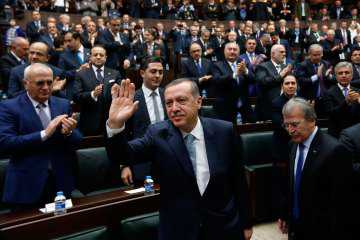Can Turkey’s Erdogan Stay in Power?
The Turkish leader’s authoritarian streak is the most important issue ahead of key elections
By Karl Vick @karl_vick
Umit Bektas / Reuters
Turkey’s Prime Minister Tayyip Erdogan greets his supporters as he arrives for a meeting at the Turkish parliament in Ankara Feb. 25, 2014.
Follow @TIMEWorld
In its first eight decades as a republic, the biggest question facing Turkey was one of identity. Would it be the secular democracy envisioned by its founder, Mustafa Kemal Ataturk, or a nation governed by the Islamic faith that defined the Ottoman Empire from whose ashes it rose? Ataturk did his best to secure the former option, sending the Caliph packing (on the Orient Express) and ordering Turks to use second names, abandon the fez and write in Roman letters. After he died, his acolytes enforced his vision with a rigidity grounded in an abiding mistrust of the masses. Four times in four decades, Kemalist generals deposed elected governments they deemed dangerous to secular rule.
But everything changed in 2002, when Turks voted the Justice and Development Party (AKP) into government, led by the charismatic and irascible Recep Tayyip Erdogan. Once an avowed proponent of political Islam, Erdogan campaigned for Prime Minister on a platform of personal piety and fair play, especially in economics. Embraced first by the conservative Anatolian heartland distrusted by the Kemalist elite, the AKP’s support grew in subsequent elections.
But as the country prepares for three more polls over the next 15 months, the most pressing issue is no longer about the secular or religious nature of the state. It’s Erdogan. Turks have to decide whether they prefer a strongman over the delicate calibrations required in a system of checks and balances.
(MORE: Turkey’s “House of Cards” moment.)
When spontaneous demonstrations erupted last May over the fate of a city park, Erdogan’s reaction validated the protesters’ assertion that the larger problem was his creeping authoritarianism. Riot police overreacted to the demonstrations, deploying tear gas and water cannons, and international outrage poured in. With the Prime Minister abroad, other AKP leaders, including President Abdullah Gul, struck a politic, palliative tone that lasted only until the boss got back. Erdogan blamed shadowy outside forces, invoking the reliable stewpot of bogeymen—hidden hands, Washington—for the unrest.
He made the same play when a massive graft investigation burst into the headlines in December. In time, the AKP closed ranks, passing bills consolidating power around its embattled leader. Gul signed a measure restricting the Internet and tracking users. Another bill tightened executive control over judges and prosecutors, a convenient move as troubling corruption allegations crept toward Erdogan himself. (The allegations should be best assessed by a judiciary visibly independent both of the Premier and the “parallel government” supposedly run by Fethullah Gulen, a moderate Islamic leader resident in Pennsylvania, that Erdogan’s allies claim is driving the probe.)
Municipal elections on March 30 will give voters their first say on all this. The opposition is uninspiring: led by Ataturk’s Republican People’s Party, it is riven by divisions and hampered by the lack of a compelling leader to take on Erdogan. But with the economy sliding, if the AKP ends up losing previous strongholds like Istanbul, the result would embolden Erdogan’s opponents. An electoral setback might also shake loose papered-over tensions within the AKP, perhaps exposing internal rivalries in time for the presidential election in August.
According to an AKP spokesman, Erdogan, who is barred by party rules from returning as Premier, will seek that office. But if the incumbent, Gul, also chooses to run, the resulting split within the ruling party could give voters the credible alternative to Erdogan that the opposition has thus far failed to provide. Gul is a devout Muslim who, in contrast to the Prime Minister’s majoritarian tendencies, talks of pluralism and the rule of law.
A more cynical scenario involves the parliamentary polls set for June 2015. Were Gul to vacate the presidency and were the AKP to prevail in the legislature yet again, analysts note he would be available to resume the premiership in place of Erdogan. Gul already performed that role in 2002, when a prior conviction for Islamist politicking barred Erdogan from immediately assuming office. Another job-swap in 2015 would for now close the door on the possibility that in the absence of a credible opposition, a viable alternative to Erdogan might emerge from within the AKP.
via Turkey Prime Minister Recep Tayyip Erdogan in Political Trouble | TIME.com.

